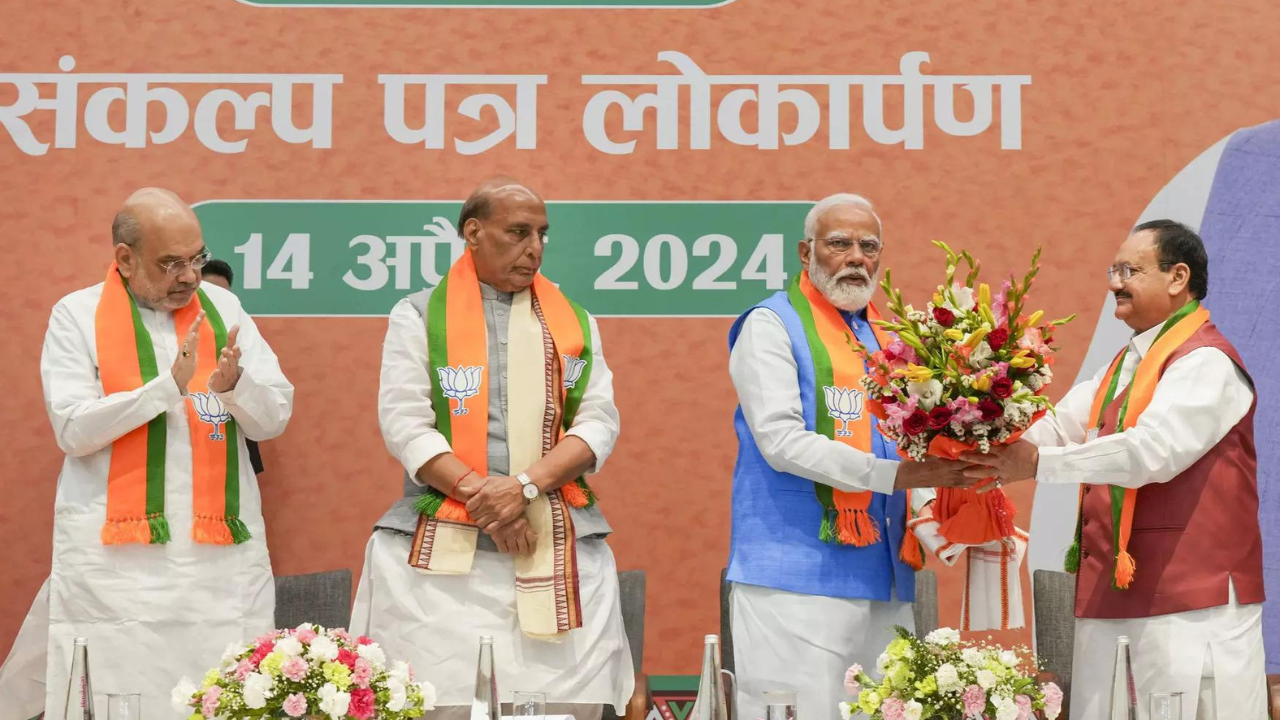BJP banks on PM Modi’s record, offers no revdis, vows developed nation by 2047

NEW DELHI: BJP on Sunday released its election manifesto, betting big on PM Narendra Modi‘s credibility as the “man who delivers” and the party’s development plank, while dodging the temptation to match promises made by its opponents.
The ‘Sankalp Patra’ builds on Modi’s vision of India becoming a developed country by 2047 to detail the planks of the aspiration – further acceleration of infrastructure creation and upgrade marked by expansion of bullet train network, launch of ‘new age’ trains and modern airports, construction of more expressways and an ambitious plan to develop the country into a global manufacturing powerhouse.
The bold intent extends to help India emerge as a ‘product nation’, defence manufacturer, global hub for railway manufacturing, centre for aircraft manufacturing and MRO (Maintenance, Repair and Overhaul) activities, a site of ship building as well as semiconductor, chip manufacturing and bio-manufacturing hubs.
Simultaneously, the party has also tapped into the excitement over the rise in India’s global geopolitical heft with enough soft power of its own.
BJP has promised to implement the recommendations of a high-powered panel for simultaneously holding all elections across India. The party has also said it will provide for a common electoral roll for all levels of polls.
Document a play on what BJP sees as a ‘confident nation’
The contrast from Congress and other opposition parties is clear, with BJP refusing to play catch up on the populist track and mentioning fiscal prudence as a mantra for economic management. It has kept its distance from caste census, which is seen by many as a popular theme with the majority of the population. It has also held its own against Congress’s promise for a legal guarantee for MSP for farm produce, and goes on to talk about incentivising crop diversification.
The 76-page document, with the imprint of Modi writ large all over it, is a play for what BJP views as a confident nation, with new goals to pursue.
On the issue of jobs, it has restricted itself to the promise of creation of quality jobs, skilling, promotion of self-employment through expansion of startups, Mudra and Svanidhi schemes and steps to help vendors, transparent recruitment for govt jobs and the assertion that the govt has speeded up filling of vacancies over the last few years.
The restraint may appear to be a gambit, but seems to reflect an assessment that significant sections have ceased basing their voting preference on freebies offered to them. It also reflects the confidence and self-assuredness that was visible in the bland interim budget earlier this year.
The party is clearly laying store by Modi’s track record in fulfilling promises and the manifesto has a full “mission accomplished” section — from Ram Mandir to Article 370.
But it is not that the party has not tried to reach out to specific sections. The promise to extend Ayushman Bharat health insurance scheme to senior citizens of 70 years of all income brackets and seeking to provide essential services at home is one such. The promise of a constituency in Tamil Nadu has led the party to use the manifesto to signal its friendly intent to the state, thus far an indifferent geography amid rising support for the party elsewhere, by a display of reverence for the legendary Thiruvalluvar.
The party has promised to build upon established vote-spinners like Ujjwala gas connection scheme, free ration and subsidised rural housing. Help has been promised also for women and those looking for homes in urban areas.
Of course, the successes already clocked on the core issues — Ram Mandir and abrogation of 370 and the promise to score one more, on UCC — is a reminder to Hindutva adherents to reciprocate the favour.
